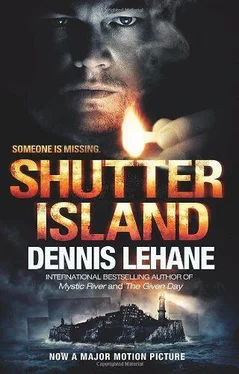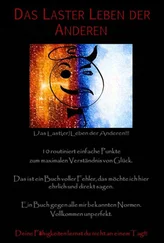“Thank you, thank you,” Chuck said. “I’ll be appearing twice nightly in the Catskills. Please come out, won’t you?”
Teddy pulled the trench coat back off his head and stood, and the rain pounded him again and the wind had found its voice.
They walked north with the cliffs off to the right and Ashecliffe shrouded to their left somewhere in the smash of wind and rain. It grew measurably worse in the next half hour, and they pressed their shoulders together in order to hear each other talk and listed like drunks.
“Cawley asked you if you were Army Intelligence. Did you lie to him?”
“I did and I didn’t,” Teddy said. “I received my discharge from regular army.”
“How’d you enter, though?”
“Out of basic, I was sent to radio school.”
“And from there?”
“A crash course at War College and then, yeah, Intel’.”
“So how’d you end up in regulation brown?”
“I fucked up.” Teddy had to shout it against the wind. “I blew a decoding. Enemy position coordinates.”
“How bad?”
Teddy could still hear the noise that had come over the radio. Screams, static, crying, static, machine gun fire followed by more screams and more crying and more static. And a boy’s voice, in the near background of all that noise, saying, “You see where the rest of me went?”
“About half a battalion,” Teddy shouted into the wind. “Served ’em up like meat loaf.”
There was nothing but the gale in his ears for a minute, and then Chuck yelled, “I’m sorry. That’s horrible.”
They crested a knoll and the wind up top nearly blew them back off it, but Teddy gripped Chuck’s elbow and they surged forward, heads down, and they walked that way for some time, bowing their heads and bodies into the wind, and they didn’t even notice the headstones at first. They kept trudging along with the rain filling their eyes and then Teddy bumped into a slate stone that tipped backward and was wrenched from its hole by the wind and lay flat on its back looking up at him.
JACOB PLUGH
BOSUN’S MATE
1832-1858
A tree broke to their left, and the crack of it sounded like an ax through a tin roof, and Chuck yelled, “Jesus Christ,” and parts of the tree were picked up by the wind and shot past their eyes.
They moved into the graveyard with their arms up around their faces and the dirt and leaves and pieces of trees gone alive and electric, and they fell several times, almost blinded by it, and Teddy saw a fat charcoal shape ahead and started pointing, his shouts lost to the wind. A chunk of something passed so close to his head he could feel it kiss his hair and they ran with the wind battering their legs and the earth rising up and chunking against their knees.
A mausoleum. The door was steel but broken at the hinges, and weeds sprouted from the foundation. Teddy pulled the door back and the wind tore into him, banged him to his left with the door, and he fell to the ground and the door rose off its broken lower hinge and yowled and then slammed back against the wall. Teddy slipped in the mud and rose to his feet and the wind battered his shoulders and he dropped to one knee and saw the black doorway facing him and he plunged forward through the muck and crawled inside.
“You ever see anything like this?” Chuck said as they stood in the doorway and watched the island whirl itself into a rage. The wind was thick with dirt and leaves, tree branches and rocks and always the rain, and it squealed like a pack of boar and shredded the earth.
“Never,” Teddy said, and they stepped back from the doorway.
Chuck found a pack of matches that was still dry in the inside pocket of his coat and he lit three at once and tried to block the wind with his body and they saw that the cement slab in the center of the room was empty of a coffin or a body, either moved or stolen in the years since it had been interred. There was a stone bench built into the wall on the other side of the slab, and they walked to it as the matches went out. They sat down and the wind continued to sweep past the doorway and hammer the door against the wall.
“Kinda pretty, though, huh?” Chuck said. “Nature gone crazy, the color of that sky…You see the way that headstone did a backflip?”
“I gave it a nudge, but, yeah, that was impressive.”
“Wow.” Chuck squeezed his pants cuffs until there were puddles under his feet, fluttered his soaked shirt against his chest. “Guess we should have stayed closer to home base. We might have to ride this out. Here.”
Teddy nodded. “I don’t know enough about hurricanes, but I get the feeling it’s just warming up.”
“That wind changes direction? That graveyard’s going to be coming in here.”
“I’d still rather be in here than out there.”
“Sure, but seeking high ground in a hurricane? How fucking smart are we?”
“Not very.”
“It was so fast . One second it was just heavy rain, the next second we’re Dorothy heading to Oz.”
“That was a tornado.”
“Which?”
“In Kansas.”
“Oh.”
The squealing rose in pitch and Teddy could hear the wind find the thick stone wall behind him, pounding on it like fists until he could feel tiny shudders of impact in his back.
“Just warming up,” he repeated.
“What do you suppose all the crazies are doing about now?”
“Screaming back at it,” he said.
They sat silent for a while and each had a cigarette. Teddy was reminded of that day on his father’s boat, of his first realization that nature was indifferent to him and far more powerful, and he pictured the wind as something with a hawk’s face and hooked beak as it swooped over the mausoleum and cawed. An angry thing that turned waves into towers and chewed houses into matchsticks and could lift him in its grasp and throw him to China.
“I was in North Africa in ’forty-two,” Chuck said. “Went through a couple of sandstorms. Nothing like this, though. Then again, you forget. Maybe it was as bad.”
“I can take this,” Teddy said. “I mean, I wouldn’t walk out into what’s going on now, start strolling around, but it beats the cold. The Ardennes, Jesus, your breath froze coming out of your mouth. To this day, I can feel it. So cold my fingers felt like they were on fire. How do you figure that?”
“North Africa, we had the heat. Guys dropping from it. Just standing there one minute, on the deck the next. Guys had coronaries from it. I shot this guy and his skin was so soft from the heat, he actually turned and watched the bullet fly out the other side of his body.” Chuck tapped the bench with his finger. “Watched it fly,” he said softly. “I swear to God.”
“Only guy you ever killed?”
“Up close. You?”
“I was the opposite. Killed a lot, saw most of them.” Teddy leaned his head back against the wall, looked up at the ceiling. “If I ever had a son, I don’t know if I’d let him go to war. Even a war like that where we had no choice. I’m not sure that should be asked of anyone.”
“What?”
“Killing.”
Chuck raised a knee to his chest. “My parents, my girlfriend, some of my friends who couldn’t pass the physical, they all ask, you know?”
“Yeah.”
“What was it like ? That’s what they want to know. And you want to say, ‘I don’t know what it was like. It happened to someone else. I was just watching it from above or something.’” He held out his hands. “I can’t explain it any better. Did that make a bit of sense?”
Teddy said, “At Dachau, the SS guards surrendered to us. Five hundred of them. Now there were reporters there, but they’d seen all the bodies piled up at the train station too. They could smell exactly what we were smelling. They looked at us and they wanted us to do what we did. And we sure as hell wanted to do it. So we executed every one of those fucking Krauts. Disarmed them, leaned them against walls, executed them. Machine-gunned over three hundred men at one time. Walked down the line putting bullets into the head of anyone still breathing. A war crime if ever there was one. Right? But, Chuck, that was the least we could have done. Fucking reporters were clapping. The camp prisoners were so happy they were weeping. So we handed a few of the storm troopers over to them. And they tore them to shreds. By the end of that day, we’d removed five hundred souls from the face of the earth. Murdered ’em all. No self-defense, no warfare came into it. It was homicide. And yet, there was no gray area. They deserved so much worse. So, fine—but how do you live with that? How do you tell the wife and the parents and the kids that you’ve done this thing? You’ve executed unarmed people? You’ve killed boys? Boys with guns and uniforms, but boys just the same? Answer is—You can’t tell ’em. They’ll never understand. Because what you did was for the right reason. But what you did was also wrong. And you’ll never wash it off.”
Читать дальше












